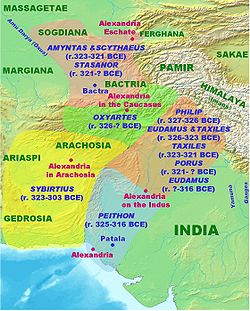
Eudemus (general)
Encyclopedia

History of India
The history of India begins with evidence of human activity of Homo sapiens as long as 75,000 years ago, or with earlier hominids including Homo erectus from about 500,000 years ago. The Indus Valley Civilization, which spread and flourished in the northwestern part of the Indian subcontinent from...
, after the murder of the Alexander-appointed satrap
Satrap
Satrap was the name given to the governors of the provinces of the ancient Median and Achaemenid Empires and in several of their successors, such as the Sassanid Empire and the Hellenistic empires....
Philip (son of Machatas)
Philip (son of Machatas)
Philip , son of Machatas, was an officer in the service of Alexander the Great, who was appointed by him in 327 BC satrap of India, including the provinces westward of the Hydaspes, as far south as the junction of the Indus with the Acesines...
by his own mercenary troops in 326 BCE:
- "Alexander dispatched letters to India to Eudamus and Taxilas telling them to take charge of the district formerly under Philip, until he himself sent a satrap to govern it." (Arrian, Anabasis of Alexander, VI.27.2)
After Alexander's death (323 BC) he made himself master of the territories of the Indian king Porus, and treacherously put that monarch to death. He by this means became very powerful, and in 317 BC brought to the support of Eumenes
Eumenes
Eumenes of Cardia was a Thracian general and scholar. He participated in the wars of the Diadochi as a supporter of the Macedonian Argead royal house.-Career:...
in the war against Antigonus
Antigonus I Monophthalmus
Antigonus I Monophthalmus , son of Philip from Elimeia, was a Macedonian nobleman, general, and satrap under Alexander the Great. During his early life he served under Philip II, and he was a major figure in the Wars of the Diadochi after Alexander's death, declaring himself king in 306 BC and...
a force of 3500 men and 125 elephants.:
- "From India came Eudamus, with 500 horsemen, 300 footmen, and 120 elephants. These beasts he had secured after the death of Alexander, by treacherously slaying King Porus" Diodorus Siculus XIX-14
With these he rendered him active service in the first battle of Gabiene
Battle of Gabiene
Battle of Gabiene was a second great battle between two of Alexander the Great's successors: Antigonus and Eumenes in the wars of the Diadochi.-Background:...
, although his troops suffered considerably from an attack by Antigonus:
- "On his left wing Eumenes stationed Eudamus, who had brought the elephants from India" Diodorus Siculus, XIX-27
- "Antigonus, now that a break was thus caused in the line of the enemy, charged through with a detachment of cavalry, striking on the flank the troops who had been stationed with Eudamus on the left wing. Because the attack was unexpected, he quickly put to flight those who faced him, destroying many of them". Diododorus Siculus XIX-30
The general of Eudemus's Indian troops, called Ceteus, died in the action.
It seems nevertheless that Eudamus was jealous of Eumenes, and joined in the conspiracy of Antigenes
Antigenes (general)
Antigenes was a general of Alexander the Great, who also served under Philip II of Macedon, and lost an eye at the siege of Perinthus . After the death of Alexander he obtained the satrapy of Susiana. He was one of the commanders of the Argyraspides and espoused with his troops the side of Eumenes...
and Teutamus
Teutamus
Teutamus was a Macedonian officer, who, in 319 BC, shared with Antigenes the command of the select troops called the Argyraspids. Of the services by which he had earned this distinguished post we know nothing...
against him, though he was afterwards induced to divulge their plans. After the surrender of Eumenes, Eudemus was put to death by order of Antigonus, to whom he had always shewn a marked hostility.:
- "Now that Antigonus had unexpectedly mastered Eumenes and all the army that had been opposing him, he seized Antigenes, the commander of the Silver Shields, put him into a pit, and burned him alive. He slew Eudamus, who had brought the elephants from India." Diodorus Siculus, XIX-44

